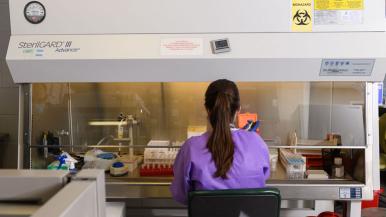U.S. Sen. Dick Durbin secured $1 million in funding for Rush University to establish the Center for Emerging Infectious Diseases as part of the federal spending package passed by Congress and signed into law by President Joe Biden.
The new center will enable continued research, training and community involvement to prepare for emerging and future health threats, while building on the University’s long-standing strength in infectious diseases and work in health equity. It will serve as a framework that supports rapid scientific and community-based response to infectious diseases, from identifying and mitigating the threat to treating and preventing disease.
“Our experience with the COVID-19 pandemic taught us the value of being prepared for future public health threats,” Durbin said. “The $1 million in federal funding I secured for Rush University’s Center for Emerging Infectious Diseases will enhance the University’s leading role in responding to these public health challenges. Rush also understands the critical need to engage our communities with a goal of improving health care for all. Waiting until the next pandemic comes along will be too late.”
“We are grateful to Sen. Dick Durbin for supporting our vision for addressing emerging health threats and securing the funding for the center,” said Rush University President Sherine Gabriel, MD, MSc.
The federal spending package allows members of the U.S. House and Senate to request money for projects that benefit the communities they represent. In addition to the center’s funding secured by Durbin, the $200 million for Illinois projects allocates $696,000 for the Rush Education and Career Hub for Information Technology program (REACH for IT) for Black and Latinx middle and high school students. The funding for REACH for IT was secured by U.S. Rep. Danny Davis and U.S. Sen. Tammy Duckworth.
With Rush’s partnership with West Side United and investment in the Rush BMO Institute for Health Equity, the Center for Emerging Infectious Diseases will be exceptionally well-positioned to reach and involve underrepresented populations.
“Rush’s tremendous response to COVID-19 grew out of the institution’s depth of experience in addressing infectious diseases and public health crises,” said Andrew Bean, PhD, dean of the Graduate College and interim vice provost of research at Rush University, who led the effort to establish the center. “Years before SARS-CoV-2, Rush played a leading role in responding to multiple public health threats including Anthrax, Ebola and SARS outbreaks. The center will provide a sustainable structure to build on the efforts of our clinicians, researchers, and students.”
Reflecting its commitment, Rush University Medical Center designed its hospital Tower 10 years ago to handle large-scale health emergencies. In addition, Rush is a leading institution for physicians and scientists who have chosen to specialize in infectious diseases.
“For many years, Rush clinicians and researchers have been at the forefront of addressing health outbreaks,” Gabriel said. “The Center for Emerging Infectious Diseases creates a structure for building on those advances in research, clinical care and community outreach, and in connecting the depth of resources across RUSH and our partners.”
To provide a 360-degree perspective on emerging health threats, the center will:
- Involve clinicians, researchers, community health teams, students, faculty, resident physicians and fellows.
- Teach transformative care through continuing education, seminar series and symposiums.
- Support faculty and trainees pursuing advanced research on emerging infectious diseases with seed money for pilot projects.
- Draw from innovative resources across Rush, including the Research Informatics Core, providing advanced data and biometric analysis work, and the Genomics and Microbiome Core Facility, which performs DNA and RNA sequencing and other advanced analysis.
- Collaborate with related partnerships, such as the Abbott Pandemic Defense Coalition, a global partnership created to detect and mitigate infectious disease threats of pandemic potential, and the Regional Innovative Public Health Lab at Rush, which contracts with the Chicago Department of Public Health to conduct genomic surveillance of SARS-CoV-2 and other analysis needed for future health threats.



